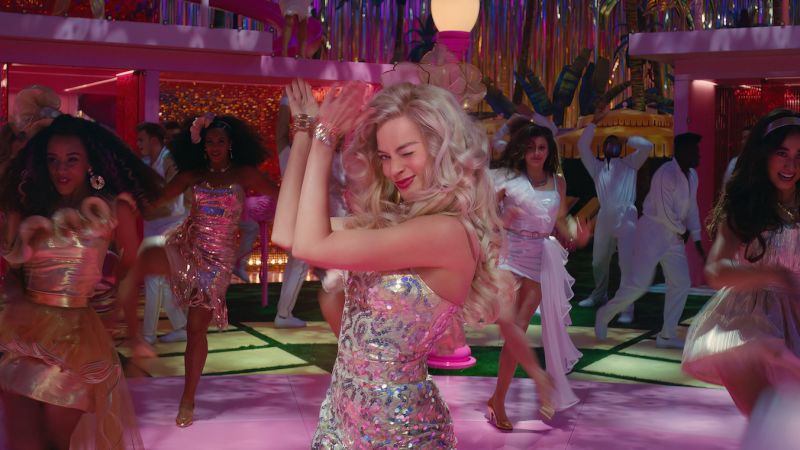Barbie has been a summer juggernaut as a cinematic feature despite outrage from the right in the United States. Dean Obeidallah argues that conservative boycotts and backlash only have traction in specific niches where their adherents are the majority of the market.
One wonders if Paramount will take note as they strategically rebrand their streaming offerings. Unfortunately, it seems they’ve been headed in the other direction.
While Discovery led the way in representation across many diverse groups, some of us have been concerned that Picard season three pulled back to more traditional gender roles and an emphasis on white cis-male heroes. SNW has a large female main cast, but the OG female command officer Number One doesn’t seem to be getting much opportunity to show heroic leadership.
Thought this conversation might be less fraught over here at Quark’s.



Thanks for engaging.
Yes Star, Trek has always been progressive, but Voyager, DS9 and Discovery stand out in the way they have given women, people of colour and the LGBTQ communities competent role models in positions of authority.
I’m not entirely convinced that Paramount is backing off representation, but I do see why fans in several communities are seeking reassurance about how progressive the shows in this era will continue to be after
— Discovery’s fifth season was unexpectedly announced as its final one
– Prodigy was pulled
— Picard season three was positioned and had overtly targeted marketing towards some of the disgruntled, overwhelming male and vocal fan critics of the other new shows and made a pitch for a Legacy show with Picard’s white male son as the future principal character.
More, Paramount+ has pushed forward towards the middle American market with the Yellowstone franchise and live sports while announcing cancellation of shows targeted at women, kids and the LGBTQ community as part of a strategic realignment.
While a menu of Star Trek shows should have room for everyone, including those who directly stated (on YouTube and in brigading of review platforms) that they felt excluded by the strong female, black and LGBTQ representation of Discovery, I can also understand why those who had only previously seen themselves in secondary characters and occasional storylines are concerned when the remaining live action Trek shows are headed by white male leads.
Yes, SNW had to be headed by Christopher Pike, and Spock needed to be there too. However, Number One continues to be overshadowed by other characters, and another male character, Jim Kirk, is frequently fulfilling the role in the stories that a first officer might be expected to. So, even with a strong contingent of female characters, it’s disquieting.
In terms of what’s to come, we should be confident, but somehow we’re not. The truth is that we don’t know what the ensemble for Starfleet Academy will be, or who the principal character will be, but we’re promised the show will be diverse. We also have a Section 31 movie event to come with Michelle Yeoh. The strikes and agitation from some fans against these two greenlight announcements are enough to create genuine uncertainty.
Many of those keen to see Legacy go forward are seeing this as a zero sum game where Academy would need to cede way to it. Whether Legacy happens, and whether it will be focused on Jack Crusher as the principal character is yet to be determined. There’s clearly a large audience hoping for a new 25th century show but the final concept and balance of the ensemble would be the question.
What the Barbie-Oppenheimer dual success opening weekend suggests is that it’s absolutely possible to serve different market at the same time and increase the total audience.
Kurtzman has been incredibly smart and strategic in pressing for a menu of shows to move the Star Trek franchise forward. I just hope that Paramount takes the lesson and keeps going forward with shows that serve all the niches.
This is a great discussion. Thank you.
I’m not sure I agree with the signs of regression though. Are these your actual complaints, or are you merely echoing those you have seen elsewhere? Some of them seem borderline disingenuous.
I don’t think that who is in the position of authority is or should be the method for determining or measuring diversity. If it is, then SNW will always just be a show with the Cis-White-Male captain, which was unavoidable.
The primary cast for SNW is entirely diverse. You can argue there are 2 cis-white-male characters in the main cast, but the Character Spock is a character who has faced discrimination from both sides of his mixed heritage, and is far from a standard male character. I would argue there’s 1-1.5 standard cis-white-male characters in the cast. The closest modern analogy to Spock would be a mixed-race highly neurodivergent cis-male. Neither Spock nor Pike were optional characters for the premise of the show.
Every other character is diverse.
Sure, Una could be given a larger spotlight, but it would likely not be at the expense of Pike… it would be taking away from other members of the diverse cast. Thus far, off the top of my head, she’s been a primary character in 3-4 episodes. With 17 episodes aired, how many would be a proper amount? Like any Star Trek at its best, SNW shines largely because of the ensemble cast. I love Una and can’t wait to see more of her, but that’s also true of the rest of the cast.
Discovery being ended after 5 seasons is disappointing, but I don’t feel that it has anything to do with Diversity.
Yes, Picard S3 was less diverse than other modern Treks, but they gave us what most of us really wanted, and it was one more (likely last) adventure with our old friends.
Again, Prodigy being cancelled sucks, but I highly doubt diversity had anything to do with it. The entire main cast was aliens. Janeway’s primary role on the show was ‘computer’, so I’m not sure she even really counts as an authority figure, but she functioned as one more often than not, so that’s fair… but again, is there any real basis for pointing towards diversity here?
The pitch for Legacy as a new Trek show… this is not anti-diversity just because one of the main characters is cis-white-male, is it? The other two main characters we would know thus far would be Seven and Raffi. This especially doesn’t fit with the argument if the issue with Una is that she’s the diverse character of authority… Jack Picard/Crusher would not be an authority figure, he would be subordinate (highly) to both Seven and Raffi.
“I can also understand why those who had only previously seen themselves in secondary characters and occasional storylines are concerned when the remaining live action Trek shows are headed by white male leads.”
A single remaining live action Trek show is headed by a white male lead. It was entirely unavoidable given the premise (and it’s a PHENOMENAL show).
There are two upcoming shows(hopefully), one with a guaranteed non white male lead, one we have no clue, but a promise for diversity none the less (and no reason to doubt them given their recent track record, IMO). One potential new show, which would have at least one male lead, but once more, not the main character in the position of authority. That show would be guaranteed (unless there’s some serious fuckery) to have a female lead as the captain.
I see nothing concerning about any of this other than the fact that Paramount, like every other streaming service, is beginning to trim fat as we near the end of the expansion phase of the streaming wars. Between that and the Hollywood strikes, I have major concerns about the future of the Trek shows we are hoping for (and the ones we have now), but I don’t see any tendency towards a lack of diversity.
Sorry I’m late to the party. Didn’t realize the conversation was a few days quiet when I started to reply.
@LordTrychon @StillPaisleyCat This might be the worst post I’ve seen on fedi.
Thank you for tagging me and informing me. I will now perform the self-humiliation ritual.
@LordTrychon No need, you have already performed the ritual with your post. :smug1:
Be honest, you’re just upset that there’s no cyclopian representation on the crew, aren’t you?
@LordTrychon That’s right bro. Why would I watch a show with no cute cyclops girls?
deleted by creator
deleted by creator
Is the new Futurama any good?
@LordTrychon Like the original, it mostly sucks.
No worries. Quark’s is still a small community. The clock isn’t ticking. Engagement is very welcome.